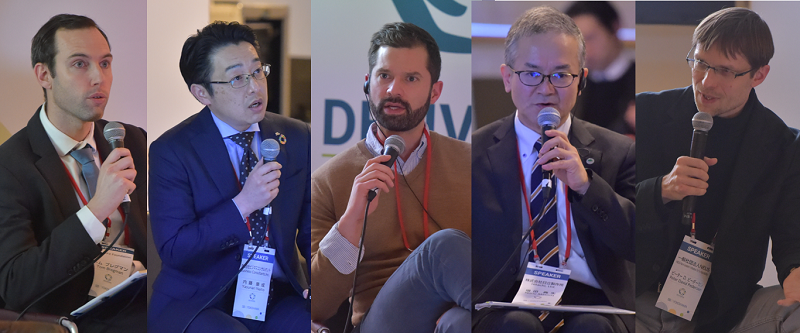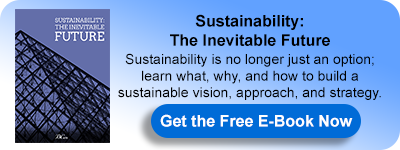The Frameworks for the Future Adaptive Companies: Cases in the US, the UK, and Japan

From left: Mr. Bregman, Mr. Naito, Mr. Krohn, Mr. Masuda, and Mr.Pedersen (facilitator);
Sooner or later, a company is expected to shift to a sustainable brand that is adapted to future management and social issues. However, while sustainability and ES (Environmental and Social) responses are becoming the competitive cornerstones, implementation tools that create and evaluate frameworks have not yet been established. I would like to examine the fundamental issues about why sustainability management is necessary, by introducing the frameworks in the US, the UK, and Japanese companies’ efforts at Sustainable Brand 2020 Yokohama. (Kaori Matsushima)
Mr. Pedersen, quoting "The road not taken" by Robert Frost, the U.S. poet, said, “Sustainability management will become a common path in the future. How we can determine the path ahead is crucial." Company management processes had traditionally been valued at Q (quality), C (cost), and D (delivery). However, the foundations and contexts of value creation have been changing because constraints on ES (environmental and social) activities have emerged, and global public opinion on SDGs (Sustainable Development Goals) have become more active over the five years before.
Pedersen said strongly, "Without sustainability in value management, companies can not reform the future." Moreover, he emphasized the need to convert to a sustainable brand as we are facing the era that value management does not function without ES activities.
The Meanings of Trade-offs Should Be in Consideration
The SB Brand Transformation Roadmap developed by the US Sustainable Brands has five categories and levels and can easily measure internal engagement. Daniel Krohn from US Sustainable Brands explained, “We just need to take steps on systems and brand influence to be transparent in governance, as well as reforming operations and supply chains to be regenerative”. Furthermore, it is important to clarify partnerships and next steps.
The UK Future-Fit Foundation that develops tools to evaluate future-adaptive companies, is advocating “Future Fit”, which states the foundation of a corporate activity is based on the environment and society. Until now, companies have placed a heavy emphasis on making profits and put a burden on the environment and society. However, corporate activities need a balance because the foundations are environments and society. As this requires a trade-off that sacrifices something for achieving, we need to think about its meaning.
Mr. Bregman from UK Future-Fit Foundation said, “Companies are required to show various information to the world, but it is important to understand why.” He also continued, “We need the evaluation methods that show our progress and ranking, as well as a short-term target indicator from the last year."
Pedersen mentioned, “We are entering an era where there is no future if we are involved in the trade-off between business developments and the environments. Although English native speakers may not understand “trade-on,” the opposite of the trade-off, we need to do a "trade-on" type business that is called “regenerative” or “restorative.” What companies are expected to do the most is to regenerate and restore the natural capitals that we are loosing. And in Japan, it is a key factor that executives understand that.”
To Understand the Need of Transformation
Business consultants, Inc. (BCon) has introduced Future-Fit as a sole partner of Future-Fit Foundation in Japan since 2018. As the result, BCon delivered the products to 20 companies in 13 industries. Mr. Naito from BCon says, "There is a sense of uncertainty and confusion about what is different from ISO and why we use these indicators. But Future-Fit can be a communications tool to realize sustainability." He also emphasized that the sustainability promotion needs consensus building among stakeholders, saying, “A backlash will come if we do not know the need for change.”
On the other hand, Hitachi, Ltd. does not use the two frameworks and tackles them on the basis of its own sustainability strategy. Its evaluation method adopts the triple bottom line that emphasizes "social value," "environmental value," and "economic value", and organizes 11 out of 17 goals in SDGs as being related to corporate activities. "If we can tell the story of how to hedge risk by visualizing both the positive (value) and negative (load) of the environment and society created by our business, we will be able to differentiate our businesses," and “These ideas are not trade-off but trade-on that must be implemented.” says Mr. Masuda and shared his thoughts of applying this evaluation method in making decisions on business investments and loans. The impact from both quantitative and qualitative viewpoints will be summarized, and will be discussed in the future business strategy meeting using the logic model chart.
"Without sustainable innovation, there is no innovation. Innovation creates new value. If it destroys the environment and society, nothing can not be created. If the core departments involved in the innovation do not understand it, then educate and influence them to understand it. The frameworks described by the two companies are also useful for such education," says Pedersen.
Facilitator:
Peter D. Pedersen, Executive Director of NELIS / Adjunct Professor of Shizenkan Graduate School of Leadership and Innovation and Center Leader
Panelist:
Tom Bregman , Corporate Engagement Manager, Future-Fit Foundation
Yasunari Naito, Manager, Sustainability Solution Team, IPC Headquarters, Business Consultants, Inc.
Norio Masuda, Senior Manager, Sustainability Promotion Division, Hitachi, Ltd.
Daniel Krohn, International Partnerships Manager, Sustainable Brands
This article was originally written and posted by Sustainable Brands Japan. Read the original article HERE (Japanese)
For more about the topic of sustainability, download our latest book " Sustainability: The Inevitable Future " for FREE:
